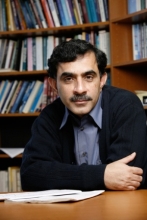Devesh Kapur Co-authors Book on Success of America’s ‘Other One-Percenters’

A new book examines the growth and success of the Indian-American community in the United States, both Indian-born and American-born.
The Other One Percent: Indians in America is a collaborative book written by Devesh Kapur, director of the Center for Advanced Study of India and a professor of political science.
It is the first comprehensive account of the nation’s Indian community, which make up about 1% of the American population and according to the book is “the most well-educated and highest-earning income group among all immigrants in the country.”
“Its impact is only now beginning to be felt, since the majority of the population migrated from India after 2000,” said Kapur, who is also the Madan Lal Sobti Chair for the Study of Contemporary India at Penn.
Today there are more than twice as many Indians in the U.S. than at the turn of the millennium. The book explains that the group’s rapid rise is directly tied to the information technology boom, immigration policies in the U.S. and higher education policies in both India and the U.S.
The book focuses on reasons why the population chose America as a destination for international immigration, the multi-generational community’s gradual assimilation and the decision by many group members to become entrepreneurs. The book documents the immigrants’ geographic movement within the U.S., and reflects on the social, linguistic, political and class structure of their native land, and the resulting challenges of integration.
The Other One Percent is a follow-up to Kapur’s prior book, Diaspora, Democracy and Development: The Impact of International Migration From India on India, for which he earned a 2012 ENMISA Distinguished Book Award of the International Studies Association.
“The earlier book examined the impact of emigration of Indians from India,” Kapur said. “The new book is in a sense a mirror image. It examines the impact of immigration of Indians to the United States.”
The Other One Percent is data driven and demonstrates the impact that people of Indian origin have had in various fields, most notably IT, higher education (especially engineering) and in the health sector. The book further examines Indian entrepreneurship in industries ranging from high-tech startups and medicine to hospitality and retail.
The authors also show how selection, or determining who comes from India to the U.S., global changes in technology and trade and policy changes in both India and the U.S. have shaped the economic success of this group of immigrants.
Kapur co-authored The Other One Percent with Sanjoy Chakravorty, a professor of geography and urban studies at Temple University, and Nirvikar Singh, a professor of economics at the University of California, Santa Cruz.
Visit the Penn Current's article to learn more about the book.





